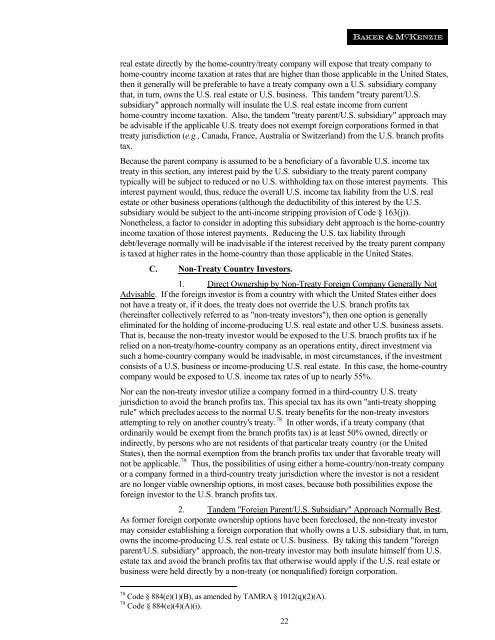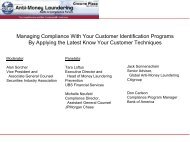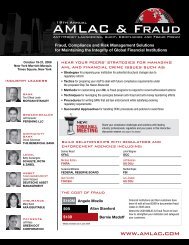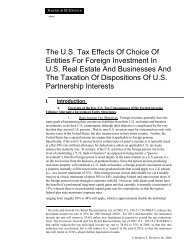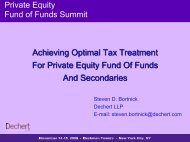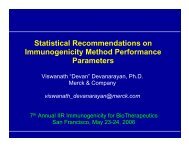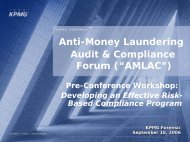The US Tax Effects Of Choice Of Entities For Foreign Investment - IIR
The US Tax Effects Of Choice Of Entities For Foreign Investment - IIR
The US Tax Effects Of Choice Of Entities For Foreign Investment - IIR
Create successful ePaper yourself
Turn your PDF publications into a flip-book with our unique Google optimized e-Paper software.
eal estate directly by the home-country/treaty company will expose that treaty company to<br />
home-country income taxation at rates that are higher than those applicable in the United States,<br />
then it generally will be preferable to have a treaty company own a U.S. subsidiary company<br />
that, in turn, owns the U.S. real estate or U.S. business. This tandem "treaty parent/U.S.<br />
subsidiary" approach normally will insulate the U.S. real estate income from current<br />
home-country income taxation. Also, the tandem "treaty parent/U.S. subsidiary" approach may<br />
be advisable if the applicable U.S. treaty does not exempt foreign corporations formed in that<br />
treaty jurisdiction (e.g., Canada, France, Australia or Switzerland) from the U.S. branch profits<br />
tax.<br />
Because the parent company is assumed to be a beneficiary of a favorable U.S. income tax<br />
treaty in this section, any interest paid by the U.S. subsidiary to the treaty parent company<br />
typically will be subject to reduced or no U.S. withholding tax on those interest payments. This<br />
interest payment would, thus, reduce the overall U.S. income tax liability from the U.S. real<br />
estate or other business operations (although the deductibility of this interest by the U.S.<br />
subsidiary would be subject to the anti-income stripping provision of Code § 163(j)).<br />
Nonetheless, a factor to consider in adopting this subsidiary debt approach is the home-country<br />
income taxation of those interest payments. Reducing the U.S. tax liability through<br />
debt/leverage normally will be inadvisable if the interest received by the treaty parent company<br />
is taxed at higher rates in the home-country than those applicable in the United States.<br />
C. Non-Treaty Country Investors.<br />
1. Direct Ownership by Non-Treaty <strong>For</strong>eign Company Generally Not<br />
Advisable. If the foreign investor is from a country with which the United States either does<br />
not have a treaty or, if it does, the treaty does not override the U.S. branch profits tax<br />
(hereinafter collectively referred to as "non-treaty investors"), then one option is generally<br />
eliminated for the holding of income-producing U.S. real estate and other U.S. business assets.<br />
That is, because the non-treaty investor would be exposed to the U.S. branch profits tax if he<br />
relied on a non-treaty/home-country company as an operations entity, direct investment via<br />
such a home-country company would be inadvisable, in most circumstances, if the investment<br />
consists of a U.S. business or income-producing U.S. real estate. In this case, the home-country<br />
company would be exposed to U.S. income tax rates of up to nearly 55%.<br />
Nor can the non-treaty investor utilize a company formed in a third-country U.S. treaty<br />
jurisdiction to avoid the branch profits tax. This special tax has its own "anti-treaty shopping<br />
rule" which precludes access to the normal U.S. treaty benefits for the non-treaty investors<br />
attempting to rely on another country's treaty. 78 In other words, if a treaty company (that<br />
ordinarily would be exempt from the branch profits tax) is at least 50% owned, directly or<br />
indirectly, by persons who are not residents of that particular treaty country (or the United<br />
States), then the normal exemption from the branch profits tax under that favorable treaty will<br />
not be applicable. 79 Thus, the possibilities of using either a home-country/non-treaty company<br />
or a company formed in a third-country treaty jurisdiction where the investor is not a resident<br />
are no longer viable ownership options, in most cases, because both possibilities expose the<br />
foreign investor to the U.S. branch profits tax.<br />
2. Tandem "<strong>For</strong>eign Parent/U.S. Subsidiary" Approach Normally Best.<br />
As former foreign corporate ownership options have been foreclosed, the non-treaty investor<br />
may consider establishing a foreign corporation that wholly owns a U.S. subsidiary that, in turn,<br />
owns the income-producing U.S. real estate or U.S. business. By taking this tandem "foreign<br />
parent/U.S. subsidiary" approach, the non-treaty investor may both insulate himself from U.S.<br />
estate tax and avoid the branch profits tax that otherwise would apply if the U.S. real estate or<br />
business were held directly by a non-treaty (or nonqualified) foreign corporation.<br />
78 Code § 884(e)(1)(B), as amended by TAMRA § 1012(q)(2)(A).<br />
79 Code § 884(e)(4)(A)(i).<br />
22


